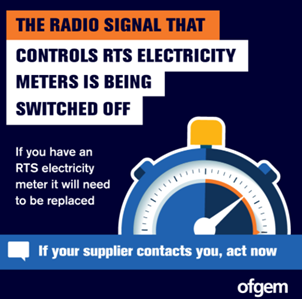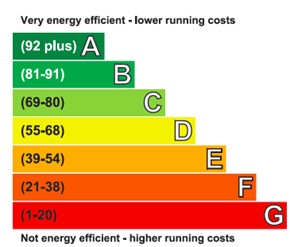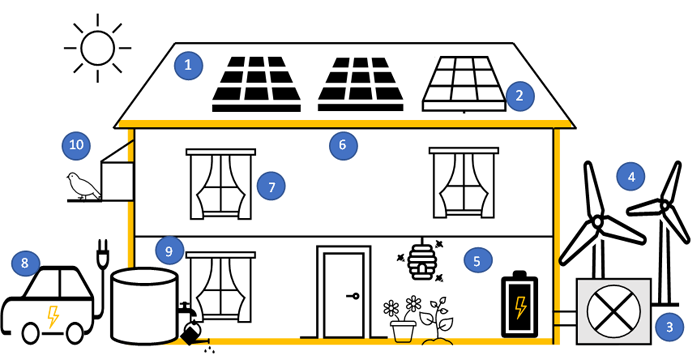Energy saving advice
Being energy efficient can save you money and help the environment. You can be energy efficient by looking at ways to conserve energy through to making decisions about how ongoing energy needs are met, such as using renewable sources.
Energy Advice Survey
West Suffolk Council are offering homeowners, private renters and landlords an opportunity to have free energy advice that will help you improve your homes energy efficiency and reduce your energy bills by indicating what grants and schemes are available.
This will be carried out by our Healthy Homes Advisor who specialises in domestic housing energy efficiency. This survey can be done by email, telephone call or a visit to your home.
If you are interested in finding out more, please read our Energy Advice Leaflet or contact environment@westsuffolk.gov.uk or call 01284 757400.
In-person support and resources
West Suffolk Council is part of the Suffolk Climate Change Partnership and together with our partners Groundwork East residents and communities can access support for improving the energy efficiency of their homes. Groundwork’s Green Champions can visit your community to raise awareness and engage with residents to provide in depth advice. Alternatively, Groundwork can provide residents and community groups with all the tools required to engage among themselves on domestic energy efficiency.
In both categories energy saving recommendations will be no to low cost (less than £500) however, advice on more expensive measures can be provided where residents have a particular interest.
Green Suffolk have a free Energy Advice tool for all Suffolk residents to use. The tool helps you find suitable energy efficiency measures for your home that will help make your home cosier. The measures can also help you reduce your energy bills. If you are interested in using this free energy advice tool, please visit the Green Suffolk - Energy Advice Tool webpage or follow the link Homewise - Tailored energy advice for your home to start your plan.
Radio Teleswitch Service switch off

Ofgem will be switching off the Radio Teleswitch Service as it is reaching the end of its operational life. Without this service, residents with a Radio Teleswitch Service meter will have difficulty with their heating and hot water as the meters will not have the service to tell it to swap between peak and off-peak rates.
If you have a Radio Teleswitch Service meter, please get in touch with your electricity supplier to arrange to have your meter replaced. They must replace your meter to avoid the disruption to your electricity supply.
For more information, please visit Ofgem - Replacing your Radio Teleswitch electricity meter.
For more information about smart meters, please visit the Energy Saving Trust - smart meters explained.
Smart meters
Smart meters show how much gas and electricity your home is using and how much your energy bill will be each month. This means you will have more accurate bills, and it will help you to achieve a lower energy consumption. With lower energy consumption, the amount of carbon emitted will be reduced.
Your energy supplier can install a smart meter in your home for free, you will just need to contact them to arrange an appointment.
Keep the heat
Please visit our Domestic energy efficiency funding webpage for more information.
Energy saving advice
The Energy Saving Trust provides free and impartial advice to help you be more energy efficient so you can use less energy, save money and produce less carbon emissions, helping the environment.
They also give advice on efficient home appliances. Make sure to look at the energy label to find appliances that use the least amount of energy. To find out more visit Energy Saving Trust - How to save money on my energy bills.
Additional support can be found using the following links:
- Suffolk Climate Change Partnership
- Warm Homes Healthy People
- National Energy Action (NEA) - Get Help
- Citizens Advice
Energy Performance Certificates
An Energy Performance Certificate (EPC) is needed whenever a property is built, sold or rented. Before a property is marketed to sell or rent, an EPC for potential buyers and tenants must be provided. An EPC shows how energy efficient a property is, with ratings ranging from A (most efficient) to G (least efficient).

The certificate includes the estimated energy cost and the summary of the property’s energy performance-related attributes. Furthermore, an EPC shows recommendations to make your home more energy efficient, with each recommendation supported with approximate costs and energy savings. This can help you find ways to use energy more efficiently. If you’ve had your home modified or it’s been 10 years since you got an EPC, you can renew your EPC via GOV.UK - Get a new energy certificate
You can find your EPC by searching your postcode via GOV.UK - Find an energy certificate
Install energy efficiency measures
Visit our Home energy efficiency page for information and support on energy efficiency measures such as insulation, solar panels and heat pumps that can help you save money on energy bills in the longer term.
If you are considering extending or renovating your home or building a new home, guidance and advice on what should be considered when making a planning application can be found in the West Suffolk Climate Change and Sustainable Building Planning Advice Note on our Supplementary planning guidance page.

- Solar photovoltaic (PV) panels – Solar panels capture the sun’s energy and convert it into electricity that you can use in your home. By installing solar panels you can generate your own renewable electricity which you could receive payments for extra energy generated.
- Solar thermal – A solar thermal system uses the energy from the sun to heat up water to use in the home. The solar panel absorbs the heat from the sun and the heated water or heat-transfer fluid then runs from the panels to your hot water cylinder.
- Air and ground source heat pumps. A heat pump is a device that can replace traditional heating systems such as boilers to provide space and water heating. Rather than burning a fuel to produce heat, they move heat from a low-temperature source and ‘pump’ it to a higher temperature where it can be used to provide space heating or hot water. The source is normally heat in the ground or the outside air.
- Domestic wind turbine. Households can install micro turbines, also known as small wind or ‘microwind’ turbines. When the wind is strong enough it turns the blades of the turbine, generating electricity. There are two types of ‘microwind’ turbine: Building mounted which are installed on roofs and have a fairly small capacity, averaging at 1-2kW, or Pole mounted which are freestanding and have a larger capacity of around 5-6kW.
- Battery storage and smart technology. Battery storage is typically used alongside solar pv and domestic wind turbines. It enables energy from renewables to be stored and then released when you need power most. Other smart technology such as timers and smart home automation can automatically adjust appliances to further reduce your bills.
- Loft and floor insulation, cavity wall fill, internal and external solid wall insulation. Installing insulation in your home will help keep the heat in creating a warmer and more comfortable home. It will also reduce energy bills as less will have to be spent on heating the home. Installing draft excluders will help cover any gaps around doors so that the heat doesn’t transfer into different rooms and out of the building. These can save energy usage across rooms and are easy to install. Draft excluders can help save households around £50 per year.
- Double and triple glazing. Both double and triple glazed windows will increase the energy efficiency of your property. Less heat loss means your home will be easier to keep warm, leading to lower energy bills.
- Electric vehicles and charging points. Battery electric vehicles do not produce any exhaust pipe emissions at point of use and therefore help to contribute to improved local air quality. For more information on electric vehicles visit our Electric vehicles page.
- Water conservation measures (for example rainwater harvesting). Conservation of water refers to the preservation and management of water. Rainwater harvesting is the collection of rainwater directly from the surface it falls on. Once collected it can be used for toilet flushing and garden watering.
- Nature. If you have a garden add some colourful nectar-rich flowers, berry bushes, fruit trees, bird boxes and hedgehog homes to attract nature. Add planter boxes to balconies and windowsills.
Need help paying for fuel bills?
With energy bills rising many people are finding it more difficult to pay for their energy bills. For support and advice on how to reduce energy bills and to find out if you are eligible for schemes visit our Help with fuel bills page.

